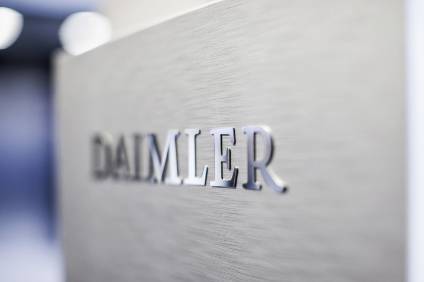
Daimler has reported final results for the second quarter ended 30 June, 2019, reflecting the gloom previewed in its earlier revision down of full year expectations due to higher provisions for Takata airbag recalls and a regulatory crackdown on diesel emissions.
As expected, the automaker booked an EBIT loss of EUR1.6bn versus a EUR2.6bn profit in Q2 2018.

Discover B2B Marketing That Performs
Combine business intelligence and editorial excellence to reach engaged professionals across 36 leading media platforms.
Unit sales slipped 1% to 822,000 passenger cars and commercial vehicles (833,000) but revenue rose 5% to EUR42.7bn (EUR40.8bn).
“Our second quarter results were mainly impacted by exceptional items of EUR4.2bn euros,” said chairman Ola Kaellenius.
“Therefore, our focus for the second half of this year is on improving our operating performance and cashflow generation. In general, we are intensifying the group-wide performance programmes and reviewing our product portfolio in order to safeguard future success.”
Daimler posted a second quarter net loss of EUR1.2bn (reversing the previous year’s net profit of EUR1.8bn). The net loss of EUR1.3bn compared with a EUR1.7bn profit a year earlier.
The loss per share was EUR1.24 compared with earnings of EUR1.61 in second quarter 2018.
Divisional
Mercedes-Benz Cars sold 575,639 vehicles in the second quarter, 3% fewer than in Q2 2018 (590,690).
Revenue fell 1% to EUR22.3bn (EUR22.6bn) and the EBIT loss of EUR672m (contrasted with Q2 2018’s EUR1,901m profit).
Return on sales was minus 3% (8.4%).
Daimler Trucks increased unit sales 2% to 126,474 vehicles (123,910). Revenue increased 14% to EUR10.5bn (EUR9.2bn), EBIT was up 33% to EUR725m (EUR546m) and return on sales was 6.9% (5.9%).
Vans unit sales were flat at 111,118 (110,883) vehicles. Revenue was 4% higher at EUR3.7bn (EUR3.5bn). EBIT fell to a loss of EUR2,050m from EUR152m profit while return on sales fell to minus 56.1% (4.3%).
Outlook
Daimler expects unit sales in 2019 at the previous year number and revenue slightly above the prior year. Mercedes-Benz Cars estimates revenue at the previous year’s level. Mercedes-Benz Vans and Daimler Trucks aim to achieve slightly higher revenue than in 2018. Daimler Buses expects significant revenue growth. Daimler Financial Services anticipates a slight increase in revenue.
Daimler expects Group EBIT in 2019 to be significantly below the 2018 level.
“Based on the measures taken, Daimler expects EBIT and free cash flow of the industrial business to improve significantly by the end of the fiscal year compared with the first half,” the automaker said in a statement.
“The ongoing high upfront expenditures for new products and technologies as well as the costs for Project Future to implement the new group structure will be a burden. Under these conditions, Daimler expects the free cash flow of the industrial business in financial year 2019 to be significantly lower than in the previous year.”
Daimler future models – Mercedes-Benz SUVs






